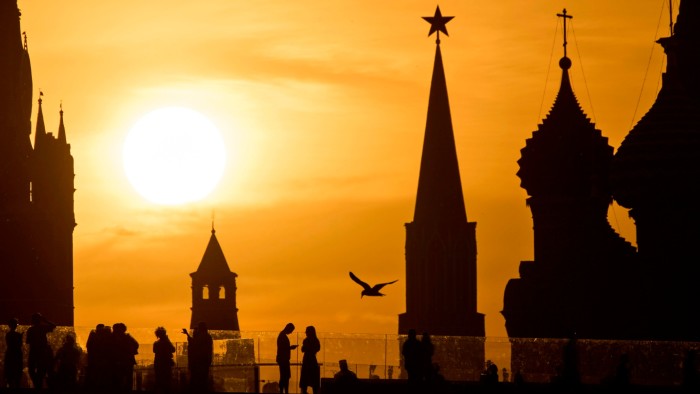Unlock the Editor’s Digest for free
The EU is weighing whether to add Russia to its “grey list” of countries with lax money laundering controls, as Brussels’ lawmakers aim to increase financial pressure on Moscow.
European Commission officials said they were considering adding Russia, a move that a majority of members of the European parliament have been advocating. But no decision has been taken, officials stressed.
Markus Ferber, a German MEP who co-ordinates economic affairs for the centre-right European People’s party, said: “There is huge support for putting Russia on the list.”
The full list requires backing from a majority of MEPs and was expected to be announced this week. But the commission pulled its adoption at the last minute for “administrative/procedural reasons”, a commission spokesperson said, adding it would be adopted early next week.
Inclusion on the list carries reputational damage and requires financial institutions to carry out extra due diligence when processing transactions involving entities or people from the listed territories, resulting in higher costs.
The EU’s anti-money laundering and counterterrorism financing grey list usually follows the one issued by the Financial Action Task Force, an intergovernmental body set up to combat terrorism financing and money laundering.
An earlier version of Brussels’ list, seen by the Financial Times, mirrored the one last issued by FATF and planned to add Algeria, Angola, Kenya, Ivory Coast, Laos, Lebanon, Monaco, Namibia, Nepal and Venezuela. It also planned to withdraw Barbados, Gibraltar, Jamaica, Panama, Senegal, Uganda and the United Arab Emirates.
Even though Russia’s membership of FATF was suspended a year after its invasion of Ukraine, several other countries would be expected to block any move to add it to the body’s own grey list.
Ferber urged Brussels to do more than simply adopt the FATF list, arguing: “[The commission] should put their own work in. FATF just assesses the legal framework and not whether it is implemented. It is not enough for us.”
FATF removed the UAE and Gibraltar from its list in 2024, but the EU’s attempt to follow suit failed last year when a majority of MEPs rejected the list. Social democrat, green and liberal MEPs objected to the Gulf state’s exclusion, while Spanish conservatives refused to lift controls on Gibraltar, a British Overseas territory claimed by Madrid.
“The socialists will not vote for the UAE and the conservatives will not vote for Gibraltar so there is no majority,” said one parliamentary group official, forcing the commission to postpone its proposal.
Adding Russia, which has been hit by EU sanctions over its full-scale invasion of Ukraine, would help to persuade MEPs to back the list, as they can only approve or reject but not amend it, officials from different parliamentary groups said.
The UAE, which is negotiating a trade deal with the EU, said the money laundering issue is complicating efforts to improve bilateral ties, according to people familiar with the talks.
Maroš Šefčovič, EU trade commissioner, launched formal trade talks last month on a visit to Abu Dhabi. The UAE has an 18-month deadline to conclude deals, putting pressure on Brussels to act swiftly.
But he and the UAE government have said the money laundering issue was separate to trade talks.
A UAE official said: “Our commitment to anti-money laundering measures is . . . strong, and is consistent with our efforts to develop regulatory frameworks in line with global best practice.”
Spain is pushing hard to resolve issues with the UK over Gibraltar after the UK left the EU in 2020. It claims sovereignty over the territory, which the Spanish king ceded to Britain in 1713, and wants to keep it on the EU’s grey list to maintain leverage in negotiations.
“I don’t think the Spanish will change their mind, especially with the Gibraltar-Brexit agreement still pending,” said one person close to the conservative People’s Party.
The PP, which is the EPP’s second-biggest delegation, is vital to winning parliamentary support for the commission’s list. The PP and EPP, the largest caucus in parliament, both declined to comment on how they would vote on the proposal.

